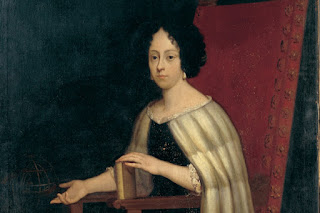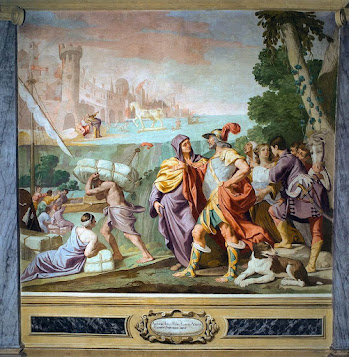Here is a first draft of my review of Anne Carson and Rosanna Bruno's Trojan Women: A Comic, which appeared in a paywalled version in TLS on 20 May 2021.
It is an exciting moment when Anne
Carson collaborates with the cartoonist Rosanna Bruno, renowned for The
Slanted Life of Emily Dickinson (2017), on the Euripidean play identified
in antiquity as the most heartrending tragedy ever written. Audience responses still
reveal the unparalleled affective power of the scenes where Andromache’s baby
Astyanax is torn from her arms and prepared for burial by his grandmother Hekabe.
The play’s reputation has created a subterranean
impact. When Philip Sidney championed theatre in his Defence of Poetry
(1581), he used a story from Plutarch’s Life of Pelopidas to illustrate
tragedy’s emotive moral instrumentality: the murderous tyrant Alexander of
Pherae was forced to leave the theatre when moved by the ‘sweet violence’ of
the depiction of the sorrows of Hekabe and Andromache. Alexander realised it
would not be expedient for his subjects to see him weep. This Plutarchan
anecdote, in conjunction with an itinerant actor’s description of Hecuba,
suggested to Shakespeare’s Hamlet the very idea that ‘the play’s the thing /
Wherein I'll catch the conscience of the king.' Claudius must leave the
theatrical production at his court because it hits, as Euripides' Trojan
Women had done long ago, far too close to home.
This tragedy’s monumental standing
makes Carson’s decision to rewrite it as ‘A Comic’ (the subtitle) provocative
and risky. When children are meeting brutal deaths and almost every female is a
rape victim, playing with generic fire requires exceptional judgement. Carson once
worked in the graphic art world; despite the success of her previous welding of
another canonical Greek tragedy, Sophocles’ Antigone, to comic book
format in Antigonick (with artist Bianca Stone, 2012), the unrelenting
focus of Trojan Women on war crimes induced scepticism in me, exacerbated
by the cover. It both intimates Bruno’s debt to the Gothic visual idioms of
Emily Carroll’s horror stories in her bestselling graphic novella Through the
Woods (2015) and announces that the tragedy will be enacted zoomorphically:
a seductive fox in high heels (Helen) stares at a dejected elderly dog (Hekabe).
Further alarm bells sounded during
Poseidon’s opening speech bubble (the text seems throughout, as in Antigonick,
to be in Carson’s upper-case handwriting, creating effects ranging from crazed diary
entries to red-top headlines). Carson has a well-earned reputation for abstruse
references. Her prizewinning ‘novel in verse’ Autobiography of Red
(1998), inspired by Stesichorus’ fragmentary lyric poem Geryoneis,
notoriously requires knowledge of cinema, photography, Plato, Dante, Heidegger,
Yeats, Whitman, Judith Butler, Homi Bhaba, Paul Celan, Woolf, Einstein, Freud,
and Emily Dickinson, among others.
My trepidation grew as her Poseidon
flippantly alludes to Hotel Troy (a former sanitorium in North Carolina featuring
Classical Revival architecture), to a (pay-walled) poem about James Baldwin by
the darling of US High Poetry circles Frederick
Seidel, and to classicist Robert Graves’ 1929 World War I memoir, Goodbye to
all That. I prefer my art less cluttered by displays of intertextual bravura.
Yet I had been converted by the last page, where Hekabe stares through the
smoke swirling upwards from the ashes of her ‘deleted’ civilisation, concluding,
‘Start me up, left leg, forward to the day of slavery. We can’t go on. We go
on’.
For Carson soon concentrates on the
unique tonality of Euripidean tragedy. It is well-known in theatre circles that while
Aeschylus and Sophocles have inspired new masterpieces of literary translation,
in English alone by such titans as Heaney, Hughes and Harrison, Euripides’
slippery, genre-transgressive, vivid and demotic bravura has rarely found an
adequate stage translator. Euripides’ theatrical verse was already acknowledged
by Aristophanes, and subsequently by Aristotle in both his Poetics and Rhetoric,
to sound like ordinary people engaged in spontaneous, idiomatic conversation. Euripidean
diction, especially in rapid-fire dialogue, turns out to be suited to
speech-balloons. The triangular altercation between Menelaus, Helen and Hecabe
works particularly well. But the ancients also celebrated Euripides’ lambent
lyric poetry, which was excerpted and performed at concerts and symposia into
the Roman era. Carson rises effortlessly to the challenge of the Trojan widows’
magnificent epitaph for their homeland, ‘sacred Pergamon itself,/rivers of Ida
washed by running snow,/sheer cliffs at dawn ablaze with holy light’.
Another characteristic of Euripidean
tragedy is sudden lurching between agony and absurdist humour. The best joke in
his oeuvre occurs in this very play, when Hekabe, fearing that Menelaus
will be seduced by Helen into sparing her life, begs him not to sail back to
Greece with the legendary beauty on the same ship. ‘Why?’, he asks in the
Greek, ‘has she put on weight?’ The image of a now-obese sex kitten threatening
to sink one of Menelaus’ Spartan triremes, occurring at a moment of utter
despair, is a quintessentially Euripidean use of humour to throw pain into
relief. Carson does justice to this memorable line, and takes inspiration from
its tone throughout.
The rhetoric Euripides gives his
dramatis personae characteristically edges dangerously near to parody as it
punctures ways in which individuals delude themselves. Cassandra’s coping mechanism, when chosen to
be Agamemnon’s concubine, is to argue that the defeated Trojans have actually emerged
better from the war than their conquerors (Carson’s text here resonates in our
era of alternative facts and fake news). She ecstatically orders the womenfolk
to celebrate her bridal, as the only character to have a visual persona in
fully human form (a gangling teenager with long hair and an inane grin). The
wedding announcement is illustrated by my favourite frame in the work,
depicting a copy of a magazine called TROJAN BRIDE, A LOVE AND WAR PUBLICATION.
It trails ‘10 tips on treating him like a king’, ‘14 clever wife hacks’, and ‘Axes:
The Perfect Accessory’, in a wittily assonantal allusion to Cassandra’s boast
that, once arrived in Greece, she will destroy Troy’s destroyers.
An example reinforcing this feminist
argument is the ‘trad wife’ Andromache’s
eulogy of her own compliance with ideal feminine virtue as dictated by
patriarchy. Euripides makes modern audiences squirm when Andromache boasts that
she always stayed at home, renounced female friends, and kept quiet, modest and
docile in front of her husband Hector. The response of Carson and Bruno is to
portray Andromache (represented by a poplar tree, of which more anon) in two
frames on facing pages, her branches in one uplifted and in the next drooping,
as her self-affirming rhetoric fails to comfort her.
There have been many classically
inspired graphic-narrative renderings of ancient myths and history. Classicists
like to claim that they were adumbrated in antiquity by e.g. Oxyrhynchus
Papyrus 2331, containing a poem about the superhero’s labours, adorned with
coloured line drawings of the Nemean Lion episode. The 20th century
saw the emergence of a rich seam of male-focussed comic-book versions of
classical narratives concerning heroic escapades, epic quests and ancient
battles, now being academically mined in, for example, George Kovacs and C.W.
Marshall (eds.) Classics and Comics (OUP 2011). But female-focussed
examples have been thin on the ground, even since Alison Bechdel’s exquisite
use of the Odyssey in Fun Home: A Family Tragicomic (2007). And
combining a female focus with a refusal to limit the graphic representation of
an ancient tragedy to anthropomorphically drawn characters is rarer still.
Depicting Hekabe as a newly homeless canine
matriarch was an obvious choice, given the ancient tradition that she was transformed at the ‘Sign of the Dog’,
Cynossema, a promontory at the narrowest part of the Hellespont. Dante, one of
Carson’s favourite authors, speals of Hekabe as ‘driven mad by sorrow and barking like a dog’ (Inferno 30.19-20). Half Carson-Bruno’s chorus of
Trojan Women are also depicted as dogs, while the remainder are cows: this is
reminiscent of the lauded public cattle herds of Troy that grazed outside its
walls as well as the dogs that Homer tells roamed at Priam’s gates. The abuse
suffered by the women comes over with strange pathos in the animal mugshots, complete
with convict-boards daubed with inmate numbers, on the page portraying the chorus’
first entrance. These stranded domesticated animals are contrasted with the feral, ‘foxy’ Helen, a Reynardian antiheroine
in false eyelashes (although later morphing into a vanity mirror), who has developed
a different strategy from Andromache’s for surviving under patriarchy: as an
ancient Greek proverb had it, ‘the she-fox masters the ox’.
The Greek soldiers, on other hand, are malevolent
cats and crows, the artwork suggestive of the burlesque epic Batryomyomachia
(Battle of the Frogs and Mice). Talthybios, the Greek herald forced to expedite
his overlords’ dirty work, is a bedraggled crow (here the comic is influenced
by Ali Smith’s exquisite picture-book for young readers, The Story of
Antigone (2016), narrated by a Theban crow, although this Trojan Women
is far too allusive and too explicit for children).
Remaining characters, however, are not
even zoomorphic. The unintelligent but elemental Poseidon is represented by an
enormous wave. The masculine Athena is symbolised by a pair of workman’s
overalls and an owl’s mask. Menelaus is a phallic-looking piece of machinery, ‘some
sort of gearbox, clutch or coupling mechanism, once sleek, not this year’s
model’. Andromache is a slim poplar, split down the middle, her treetop
invisible beyond the picture frame; she cradles the tiny Astyanax-sapling about
to be torn from her branching arms.
Why a poplar? The Astanyanax scenes in
this tragedy are so shocking and physical that a comic-book drawing of a human
mother and infant would risk turning tragedy into melodrama. In the myth of the
Heliades, the daughters of Helios were turned into poplars, transfixed as they
mourned their brother Phaethon in eternity. Astyanax is addressed at one point
as a ‘mushroom’, and ancient horticulturalists well knew that mushrooms
flourish in poplar stumps. But a fragment of the comic poet Cratinus (not so
obscure that Carson, an accomplished Greek scholar, can have avoided it) tells
us that the ‘the poplar view’ proverbially denoted a seat in the theatre so
high that it had no view of the stage. Andromache’s suffering is so exceptional
that it escapes the boundaries of art: the frames containing her cannot
accommodate her full height and topmost branches.

My final reservation about turning Trojan
Women into a comic had been the play’s metaphysical profundity. Of all
Greek tragic figures, Hekabe confronts most directly the philosophical problem of
unearned suffering, in the extreme forms of genocide, separation from
offspring, bereavement, enslavement, rape and annihilation of their physical
homeland and social bonds. This is why Sartre adapted Trojan Women in
1965 to protest against French brutality in Algeria via Existentialism; his gods
pass the death sentence alike in the opening scene, thus removing all hope, the
Sartrean precondition of meaningful action or existence. It is why theatre
director Tadashi Suzuki chose this tragedy in 1982 to explore the inadequacies
of Shinto Buddhism in response to Hiroshima. The play juxtaposes physically
manifest Olympian gods with Hekabe's explicit doubts that the gods concern
themselves with humans or exist in their traditional form at all. She appeals to the gods in an offhand
articulation of 'Pascal's wager': acknowledging god may, she says, be useless,
but best to do it just in case: Carson wittily renders this as ‘I do admire
that old mannerism of calling out to some divinity when things go wrong’. She
proposes that the supreme god is actually the physical laws that govern the
material universe, or human intelligence: Carson’s Menelaus tartly responds, ‘What’s
this? Some new-age spirituality?’ Finally, Hekabe repudiates traditional religion altogether, because, in
Carson’s bleak translation, ‘The gods had no interest in us/except to ruin me
and despise Troy’.

Carson and Bruno have risen to an unusual challenge. Their
medium’s conventions could have flattened distinctive literary qualities, but their
book instead refocuses our attention on Euripides’ styles. The format
highlights this play’s outstanding quality, praised by Sidney as 'sweet
violence'. This phrase was borrowed by Terry
Eagleton to entitle his own book on the tragic (2002), in which he said that
tragedy can only survive as a 21st-century art-form if it is metaphysically
open, aesthetically beautiful, and unflinching in its depiction of suffering.
All three criteria are fulfilled by this innovative version of Trojan Women.





































